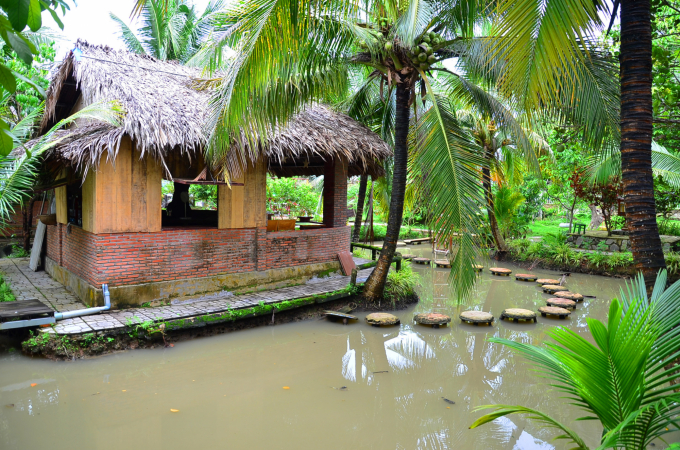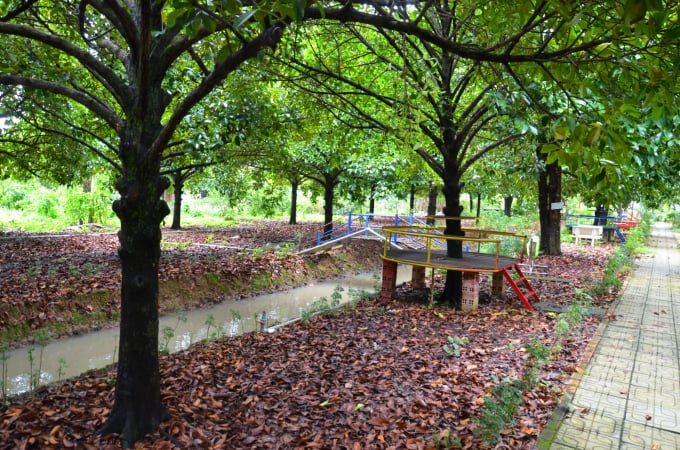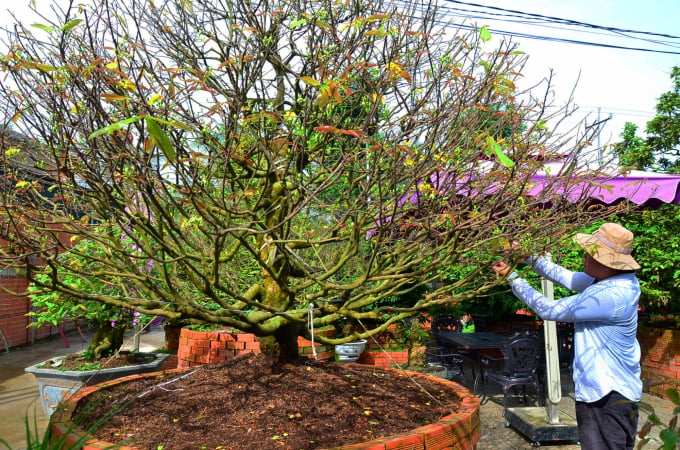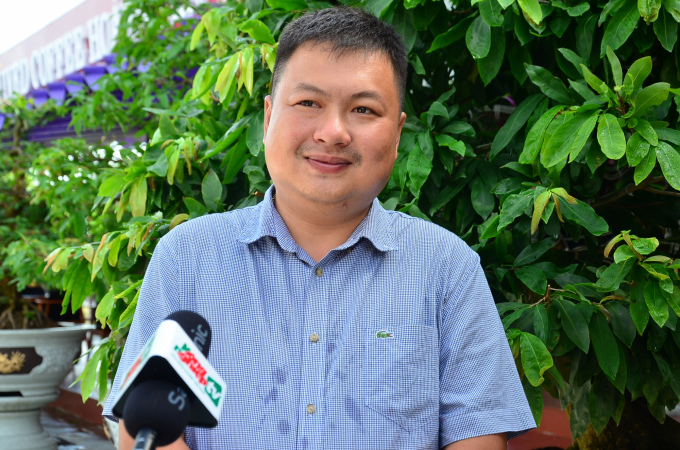November 21, 2025 | 19:40 GMT +7
November 21, 2025 | 19:40 GMT +7
Hotline: 0913.378.918
November 21, 2025 | 19:40 GMT +7
Hotline: 0913.378.918
It was already early afternoon, but Nguyen Thanh Vu, owner of Nguyen Gia Eco-tourism Area (Tan Thieng commune, Cho Lach district, Ben Tre) was still standing outside waiting to give us a warm welcome - a signature character of "people of the orchard" in the West. On the drinking tray that night there were steamed salted chicken, bitter snails (a popular snail species in the Western river), river mussels, fried giant gourami rolled with herbs and grated coconut. My colleague was full of regret because he had had too much food at lunch.

Nguyen Thanh Vu, owner of Nguyen Gia Eco-tourism Area, picking fruit from a 100-year-old mangosteen tree. Photo: Duong Dinh Tuong.
After eating to our heart's content, we walked together in the garden luxuriant with fruit trees. Vu raised his pole to the very tall branches of a huge mangosteen tree and picked a few fruits. I peeled it off, put it in my mouth, and chewed it slowly. Sweet, sour, and rich, its flourishing flavor was rare indeed.
Seeing my reaction, Vu gave out a big laugh and said, "My father told me that when it was the time of my great-grandfather, the land was wider than the eyes could see. He hired someone to look after the buffalo, but the worker accidentally let the buffalo destroy the whole mangosteen garden. Only six roots remained, and now they are over 100 years old. After every generation, the land was divided for the children, so when it comes to my father's turn, only 1.8 ha was left.”
Having some money from the "black funds" hidden from my wife, Vu worked on the garden bit by bit every year. He did not plan to do tourism at first, just to make a beautiful garden for entertainment. He only invited friends and relatives to come and spend the weekend. They found the scenery so beautiful with Co Chien river lying in front of the area and the orchards all around that they encouraged Vu to do tourism. “I started to work in this field for a while, then the Covid-19 epidemic came. My brother Nguyen Thanh Phong, a man full of enthusiasm in the application of indigenous culture into tourism suddenly died, so the establishment was closed for more than a year.”

Nguyen Gia’s green garden. Photo: Duong Dinh Tuong.
He did not plan to reopen, but then received a lot of encouragement. As a result, he made a comeback more than 2 months ago, right in the season of mangosteen and rambutan. Unexpectedly, the guests flocked to the place, crowds after crowds. Normally, 6,000 m2 of fruit orchards like this could only earn him VND 20-30 million/year, not to mention there were years he gained and years he lost. When combined with tourism, Vu could earn up to VND 200-300 million/month in the fruit season. The remaining months’ profits were estimated to be more than VND 100 million/month.
For the future, Vu had some thoughts in mind. “I just open a new orchard with longan, jackfruit, rambutan, and coconut near Co Chien river. The idea is that guests stay in the garden and then go experience the river down there. I want to cooperate with the locals to bring guests to their garden to pick fruit and pay more than they normally sell, like mangosteen can be up to VND 40,000/kg compared to the normal price of VND 25,000/kg, but no one has yet accepted. They are afraid that it is a sign of unluckiness. If I take guests to take pictures there, next year the tree would not bear fruit anymore.”

The perennial mangosteen trees, including six roots of more than 100 years old. Photo: Duong Dinh Tuong.
Fortunately, there is a unique coffee shop in the area that wishes to cooperate. It has a lot of yellow apricot trees costing hundreds of millions, even billions of dong, a marble-lined path, and delicious weasel coffee. Guests who drink weasel coffee can come to the tourism area if they want to rest, and guests of the tourism area can go to the coffee shop to drink weasel coffee. In the near future, Vu and the coffee shop owner will buy two more electric cars to transport passengers. “If you want to see it, follow me. It’s right next to this place, also in Tan Thieng commune." Without hesitation, we hit the road again.

A rare old apricot root of Hoang Yen Coffee. Photo: Duong Dinh Tuong.
Pham Van Phu, owner of Hoang Yen coffee shop, said, “As a son living in the city far from my hometown, on the occasion of Tet holiday in 2020 I returned to Tan Thieng commune (Cho Lach district, Ben Tre). I went to several yellow apricot orchards in the area, planning to buy some just to play around. But after Tet, my passion for yellow apricot blossomed. I went back and discussed with my wife to start a new business, opening a weasel coffee shop with a garden full of yellow apricots. Starting from April 2020, after 2 years, the number of yellow apricots I have collected is approximately 300 roots, including many big and beautiful roots. There are 5 - 9-petal primitive yellow apricots and yellow apricots grafted with 2-3 types of petals.”

Pham Van Phu, owner of Hoang Yen coffee shop. Photo: Duong Dinh Tuong.
The garden currently has 8 employees with 1 main artist and a helper taking care of the trees, while the rest work as waiters. A cup of coffee usually costs VND 20,000, and there are many types of weasel coffee in Hoang Yen: 10%, 20%, 30% and special. “For special type prepared using water-bath method, the price is VND 300,000/bottle, enough for 4 cups for 4 people to drink together."
And not making us wait too long, Dang Thi Thanh Hoa, an employee of the management department of the shop soon lit the alcohol on fire. The fire flickered, magically dancing. The water in the pot when boiling will reverse osmosis to help the coffee essence dissolve perfectly. Holding a cup of coffee in my hand, I felt like I smelled the scent of the mountains and forests of the Central Highlands. Gently taking a sip, a chocolate-like aroma flared up, seductive and passionate. The sweet aftertaste extended to the tip of my tongue.
Translated by Samuel Pham

(VAN) Results from the Sustainable Durian Model Project in Dak Lak have confirmed the critical role of Yara Viet Nam in transferring advanced nutritional solutions to farmers.

(VAN) In Tuyen Quang province, livestock farmers have introduced effective models and innovative practices that significantly strengthen African Swine Fever prevention and control efforts.

(VAN) This is the study conducted by IRRI and Can Tho University on the rice straw value chain in Mekong Delta showing an economic potential of more than 6.6 trillion VND/year.

(VAN) By participating in cooperative economics, many farmers in Tay Ninh have overcome hardship, mastered clean dragon fruit cultivation techniques.

(VAN) The crossbreeding program in the former Binh Dinh province (now part of Gia Lai) has shown signs of decline, and urgent measures are needed to revive it and sustain past achievements.

(VAN) The agricultural sector agreed on a roadmap to pilot the MRV protocol and expand low-emission rice production from the 2025-2026 winter-spring crop.

(VAN) Agricultural extension officers in Quang Ninh do more than transmit knowledge; they have become a steadfast support system for farmers on the path to sustainable agricultural development.